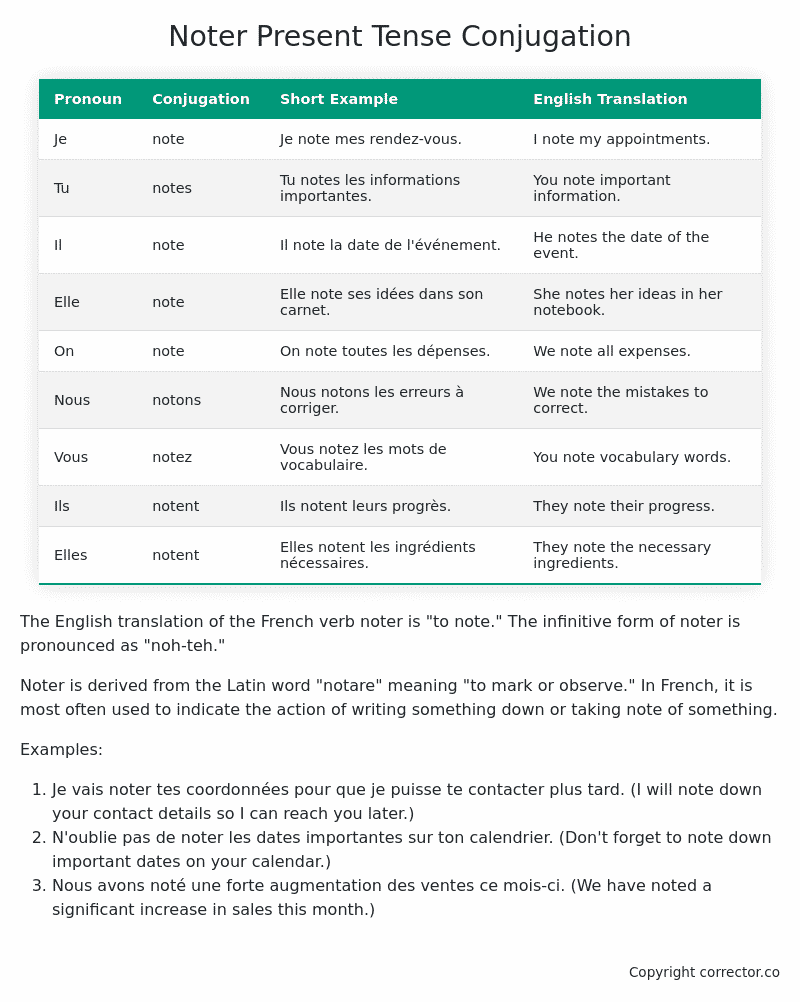Le Present (Present Tense) Conjugation of the French Verb noter
Introduction to the verb noter
The English translation of the French verb noter is “to note.” The infinitive form of noter is pronounced as “noh-teh.”
Noter is derived from the Latin word “notare” meaning “to mark or observe.” In French, it is most often used to indicate the action of writing something down or taking note of something.
Examples:
- Je vais noter tes coordonnées pour que je puisse te contacter plus tard. (I will note down your contact details so I can reach you later.)
- N’oublie pas de noter les dates importantes sur ton calendrier. (Don’t forget to note down important dates on your calendar.)
- Nous avons noté une forte augmentation des ventes ce mois-ci. (We have noted a significant increase in sales this month.)
Noter – About the French Present Tense
To take a deep dive into all the French tenses then see our article on Mastering French Tense Conjugation.
Common Everyday Usage Patterns For Le Present
Interactions with Other Tenses
Table of the Present Tense Conjugation of noter
| Pronoun | Conjugation | Short Example | English Translation |
|---|---|---|---|
| Je | note | Je note mes rendez-vous. | I note my appointments. |
| Tu | notes | Tu notes les informations importantes. | You note important information. |
| Il | note | Il note la date de l’événement. | He notes the date of the event. |
| Elle | note | Elle note ses idées dans son carnet. | She notes her ideas in her notebook. |
| On | note | On note toutes les dépenses. | We note all expenses. |
| Nous | notons | Nous notons les erreurs à corriger. | We note the mistakes to correct. |
| Vous | notez | Vous notez les mots de vocabulaire. | You note vocabulary words. |
| Ils | notent | Ils notent leurs progrès. | They note their progress. |
| Elles | notent | Elles notent les ingrédients nécessaires. | They note the necessary ingredients. |
Other Conjugations for Noter.
Le Present (Present Tense) Conjugation of the French Verb noter (this article)
Imparfait (Imperfect) Tense Conjugation of the French Verb noter
Passé Simple (Simple Past) Tense Conjugation of the French Verb noter
Passé Composé (Present Perfect) Tense Conjugation of the French Verb noter
Futur Simple (Simple Future) Tense Conjugation of the French Verb noter
Futur Proche (Near Future) Tense Conjugation of the French Verb noter
Plus-que-parfait (Pluperfect) Tense Conjugation of the French Verb noter
Passé Antérieur (Past Anterior) Tense Conjugation of the French Verb noter
Futur Antérieur (Future Anterior) Tense Conjugation of the French Verb noter
Subjonctif Présent (Subjunctive Present) Tense Conjugation of the French Verb noter
Subjonctif Passé (Subjunctive Past) Tense Conjugation of the French Verb noter
Subjonctif Imparfait (Subjunctive Imperfect) Tense Conjugation of the French Verb noter
Subjonctif Plus-que-parfait (Subjunctive Pluperfect) Tense Conjugation of the French Verb noter
Conditionnel Présent (Conditional Present) Tense Conjugation of the French Verb noter
Conditionnel Passé (Conditional Past) Tense Conjugation of the French Verb noter
L’impératif Présent (Imperative Present) Tense Conjugation of the French Verb noter
L’infinitif Présent (Infinitive Present) Tense Conjugation of the French Verb noter
Struggling with French verbs or the language in general? Why not use our free French Grammar Checker – no registration required!
Get a FREE Download Study Sheet of this Conjugation 🔥
Simply right click the image below, click “save image” and get your free reference for the noter Present Tense tense conjugation!

I hope you enjoyed this article on the verb noter. Still in a learning mood? Check out another TOTALLY random French verb present conjugation!


